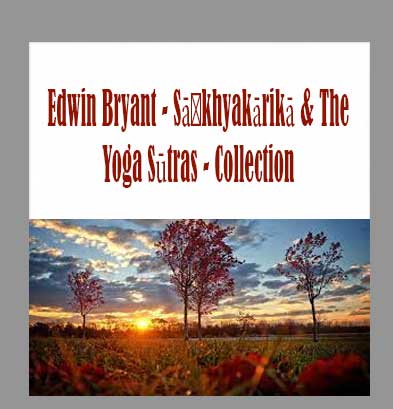
Description
Edwin Bryant – Sāṁkhyakārikā & The Yoga Sūtras – Collection download, Edwin Bryant – Sāṁkhyakārikā & The Yoga Sūtras – Collection review, Edwin Bryant – Sāṁkhyakārikā & The Yoga Sūtras – Collection free
Edwin Bryant – Sāṁkhyakārikā & The Yoga Sūtras – Collection
About
This 8-part course will undertake a comparative study of these two canonical texts of Yoga: the Sāṁkhyakārikā & the Yoga Sūtras. In the earlier tradition, Yoga is in fact an expression of Sāṁkhya rather than a distinct school, the former focusing more on meditational practice and the latter on metaphysics. Using the Kārikās as our primary text, along with its principle commentary by Gauḍapāda, we will consider where the two texts overlap, and where the Kārikās engage material not touched upon in the Yoga Sūtras. We will read all of the Kārikās, and cast comparative glances at the sections of the Sūtras that express the same concepts albeit sometimes in different terminologies.
Each group of students is different, and the teacher, too, is in a different mental place each time he or she teaches, so the schedule below will give preliminary structure to our intentions, but we will allow the course to flow organically. Mainkar’s translation of the Kārikās and Gauḍapāda’s bhāṣya will be provided; students are requested to bring any copy of the Yoga Sūtras with the Sanskrit text.
Module 1: Reasons for Seeking Liberation
In this section, we engage the essential motive for undertaking the spiritual quest in the respective traditions of Yoga and Sāṁkhya, namely suffering. The causes of suffering according to these two traditions will be examined, and the solution considered – liberation (kaivalya), along with the respective means to attain. While the two traditions share the former aspects and presuppositions in common, it is in the latter regard – the means to attain liberation, that they part company and eventually form different schools. Kārikās 1 – 5 Yoga Sūtras 1-6; 1.49; II.12-15; II.19; II.225-6
Module 2: The Nature of Prakṛti and Puruṣa
The metaphysics of Sāṁkhya and Yoga are essentially dualistic: there are two ontologically distinct entities, prakṛti and puruṣa, or the conscious self and unconscious matter. This session explores what our two canonical texts have to say about how these two diametrically distinct sorts of things can be described in conceptual terms. Kārikās 6 – 10 Yoga Sūtras II. 17 – 24
Module 3: The Three Guṇas
Following on the previous lecture, the world of matter, prakṛti, is essentially composed of three ‘qualities,’ the guṇas of Sāṁkhya – sattva, rajas and tamas. The respective nature of these three guṇas are discussed here, bolstered by some verses from the Bhagavad Gītā, which is also a Sāṁkhya text, and an excellent source for more specific information on the guñas’ role in everyday matters. Kārikās 11 – 14 Yoga Sütras II.18
Module 4: Properties of Prakṛti and Puruṣa
This session continues with the previous discussions on the respective nature of the two ultimate metaphysical entities of reality – prakṛti and puruṣa. Kārikās 15 – 21 Yoga Sūtras II.18 – II.26
Module 5: Evolutes of Prakṛti
Sāṁkhya is a metaphysically evolutionist system, in so far as gross entities such as particles are densifications of subtler energies, which in turn are emanations from still subtler energies, and on back to the subtlest matrix of all, prakṛti herself. In this session, we gain some sense of this metaphysics. Kārikās 22 – 37 Yoga Sūtras II.19
Module 6: The Subtle Body
This session engages the nature of the subtle body, also made of prakṛtic ‘stuff’ (albeit finer more sattvic stuff), which acts as the interface between puruṣa, consciousness, and the ‘world out there.’ Kārikās 38 – 42 Yoga Sütras II.18
Module 7: The Nature of Mind
This session engages how the various aspects of the mind and its mental states are differently characterized in the two systems – the vṛttis and kleṣas of yoga, and the bhāvas of Sāṁkhya. Kārikās 43-54 Yoga Sūtras I.5-13; II.3-9; II.15-18
Module 8: Liberation from Embodiment
The grand finale goal of both traditions is liberation from embodiment itself, which is the only way to ultimately be free of all suffering. This session explores how liberation is depicted in our two texts. Here we encounter some of the most beautiful verses of the Sāṁkhyakārikās. Kārikās 55 – 72 Yoga Sūtras II.23 – 28; IV29 – 34
Students who take this course will:
Engage the primary canonical text of Sāṁkhya, which is the larger metaphysical tradition within which Yoga was originally branch before it came to be situated as an independent school.
Expose themselves to the goals of life as articulated by these traditions, and their expositions on the big existential issues faced by all humans – the nature of the deep-level self, the mind and the world; and to explore their explanation of usffering, its cause, and its removal.
Analyze where the two canonical texts clearly overlap, and where their focus differs, albeit within the same metaphysical contours.
Gain a clear sense of the three guñas, accepted not only by these two schools, but fundamental to Vedānta metaphysics as well.
Gain a clearer understanding of the notion of liberation.
Author
Edwin Bryant
Edwin Bryant received his Ph.D. in Indic languages and Cultures from Columbia University. He taught Hinduism at Harvard University for three years and is presently the professor of Hinduism at Rutgers University where he teaches courses on Hindu philosophy and religion. He has received numerous awards and fellowships, published eight books, and authored a number of articles on the earliest origins of the Vedic culture, yoga philosophy, and the Krishna tradition.
As a personal practitioner of bhakti yoga for over 45 years, a number of them spent in India studying with traditional teachers, where he returns yearly, Edwin strives to combine academic scholarship and rigor with appreciation towards traditional knowledge systems. His teaching method is to allow the ancient texts to speak in their own voice and through their own terms and categories.
Edwin’s most recently published work is Bhakti Yoga: Tales and Teachings from the Bhāgavata Purāṇa (Farrar, Straus & Giroux, 2017). This work seeks to ground the practices of bhakti in the traditional Krishna-centered framework of the Vrindavan devotional traditions.
Frequently Asked Questions:
- Innovative Business Model:
- Embrace the reality of a genuine business! Our approach involves forming a group buy, where we collectively share the costs among members. Using these funds, we purchase sought-after courses from sale pages and make them accessible to individuals facing financial constraints. Despite potential reservations from the authors, our customers appreciate the affordability and accessibility we provide.
- The Legal Landscape: Yes and No:
- The legality of our operations falls into a gray area. While we lack explicit approval from the course authors for resale, there’s a technicality at play. When procuring the course, the author didn’t specify any restrictions on resale. This legal nuance presents both an opportunity for us and a boon for those seeking budget-friendly access.
- Quality Assurance: Unveiling the Real Deal:
- Delving into the heart of the matter – quality. Acquiring the course directly from the sale page ensures that all documents and materials are identical to those obtained through conventional means. However, our differentiator lies in going beyond personal study; we take an extra step by reselling. It’s important to note that we are not the official course providers, meaning certain premium services aren’t included in our package:
- No coaching calls or scheduled sessions with the author.
- No access to the author’s private Facebook group or web portal.
- No entry to the author’s exclusive membership forum.
- No direct email support from the author or their team.
We operate independently, aiming to bridge the affordability gap without the additional services offered by official course channels. Your understanding of our unique approach is greatly appreciated.
- Delving into the heart of the matter – quality. Acquiring the course directly from the sale page ensures that all documents and materials are identical to those obtained through conventional means. However, our differentiator lies in going beyond personal study; we take an extra step by reselling. It’s important to note that we are not the official course providers, meaning certain premium services aren’t included in our package:
Refund is acceptable:
- Firstly, item is not as explained
- Secondly, Item do not work the way it should.
- Thirdly, and most importantly, support extension can not be used.
Thank you for choosing us! We’re so happy that you feel comfortable enough with us to forward your business here.








Reviews
There are no reviews yet.